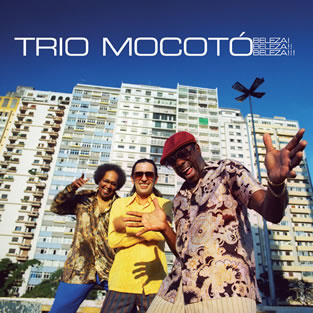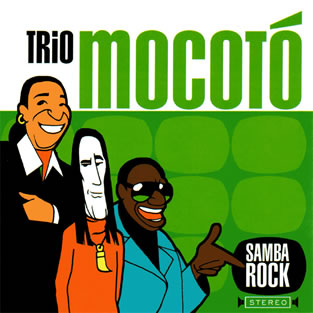
Considered by many as the "Fathers of Samba Soul", legendary veteran Brazilian band Trio Mocotó have made a remarkable comeback : they reformed in 2001 after an absence of over twenty years and unleashed the joyful 'Samba Rock' album , which gained them a whole new generation of fans around the globe.
In 2004 came "Beleza ! Beleza !! Beleza !!!", an even stronger, funkier and groovier album recorded in São Paulo by the band's revised line-up featuring original members João Parahyba & Nereu Gargalo and new vocalist/guitarist Skowa.
Trio Mocotó were formed in the late Sixties, during that effervescent period where Brazil's society and music scene underwent major changes. The political situation was tense. At the same time, the youth was absorbing influences from the US and Europe: rock music, the hippie movement and Black Power all had a major impact, and soon a new generation of artists was coming to the forefront: the Ieieie (for "yeah yeah yeah") scene with people like Roberto Carlos, Erasmo Carlos and Wanderléa, the Tropicália movement (with the Mutantes, Tom Zé, Caetano Veloso, Gilberto Gil etc), soul-influenced singers such as Wilson Simonal and many more.
Meanwhile, at a small São Paulo club called O Jogral, journalists, musicians, composers and writers, students and bohemians were defining the contours of a new sound about to explode. Born from the swinging guitar grooves (half samba, half rock) developed by Jorge Ben and the contagious rhythms of the three percussionists hired by the club: Nereu Gargalo on the tambourine, Fritz Escovão on the cuíca and João Parahyba on that strange instrument called the timba. The groove became the trademark of the jams between Jorge Ben and this trio of young ace percussionists, leading to the birth of a new style which became known as Samba Rock. Their songs were full of joy, humor and spontaneity, with harmonies oscillating between bossa nova, rock and soul music.
Nereu, Fritz & João were soon baptized 'Trio Mocotó' by Jorge Ben, who invited them to become his backing band on "Jorge Ben 1969", which turned out to be his breakthrough album and contained the original version of his big hit País Tropical.
The fans, the Jogral crowd, the friends in the underground O Pasquim newspaper, everybody elese wanted more Mocotó with Jorge Ben! From this partnership were born songs like Criola, Cosa Nostra, Carolina Carol Carolina Bela, and Que Maravilha, with Toquinho, which all ended up on the seminal Jorge Ben album "Força Bruta" (1970). The Trio also recorded with Chico Buarque and the duo Toquinho & Vinícius de Moraes (Tarde em Itapoã and Regra três, among many). The Trio's solo career soon took off with hits such as Coqueiro Verde, Aleluia Aleluia, Palomares, Sorriso de Narinha, Nereu Nereu, Swinga Sambaby, Não Adianta, and the amazing cover of Burt Bacharach's Raindrops Keep Falling On My Head, arranged by revered Tropicália maestro Rogério Duprat.
The Trio ended up recording three albums, and disbanded in the late '70s. Twenty years later, DJs and producers in London, Paris, Tokyo and New York started rediscovering the famous Mocotó beat and bringing the Samba Rock vibe to dancefloors around the world. This also contributed to reawaken the Brazilian musicians' interest: all of a sudden, the Trio have become icons for the likes of DJs such as Marky and Patife, rappers (Thaíde, Rappin Hood and Marcelo D2), for the funky crowd (Paula Lima, Funk Como Le Gusta) and the press.
The Trio were thus ready for a triumphal return. Sometime in 2001, the original three members decided to reform the band and to record a new album, simply entitled "Samba Rock". João Parahyba had already been working with Ziriguiboom (he was a close musical partner of producer Suba, and had played percussion on Suba's acclaimed "São Paulo Confessions" album as well as on Bebel Gilberto's "Tanto Tempo"), so the association with Crammed's Brazilian imprint was only natural. Another partner was brought in: up-and-coming independent Brazilian label YBrasil?music, who handled the production of the album in their São Paulo studios.
Samba Rock was warmly received. The band toured extensively and appeared at major festivals such as Montreux Jazz, Nice Jazz Festival, Womad Festivals (UK, Greece and Canary Islands), Eurockéennes (France), Cartagena (Spain) and many more. They also received the Best Musical Group Award from Brazil's prestigious APCA (Associação Paulista dos Críticos de Arte).
By the time Trio Mocotó were ready to record a new album, a major change had occured in the line-up: Fritz Escovão retired, and was replaced by a new member: acclaimed artist, producer and multi-instrumentalist Skowa, who brings a special tilt to the band's sound with his soul-influenced vocals, his entertaining stage presence and his funky wah wah guitar.










